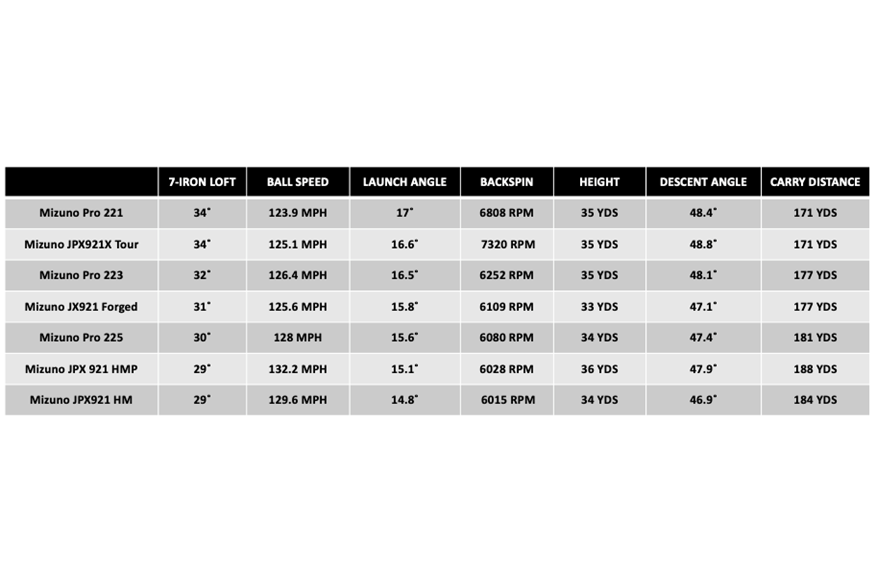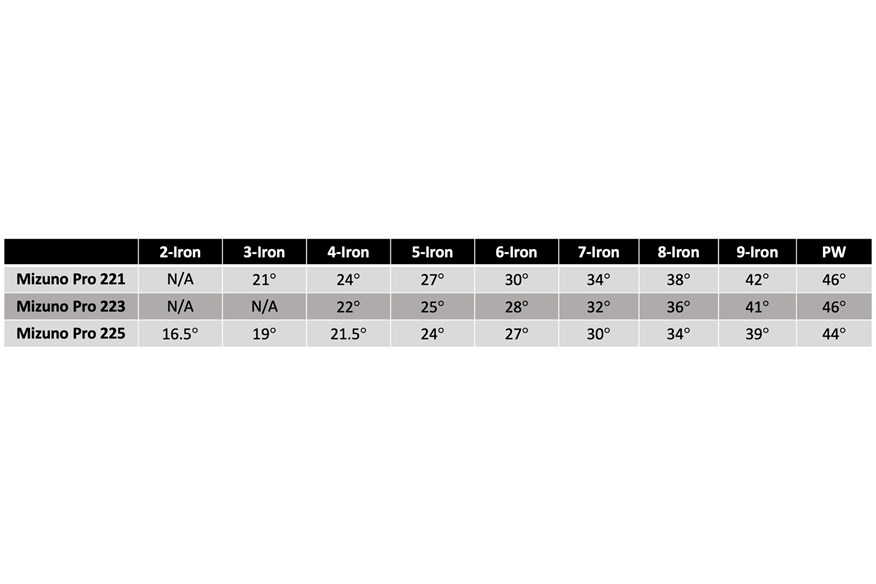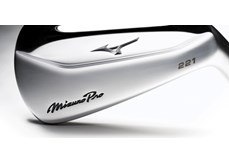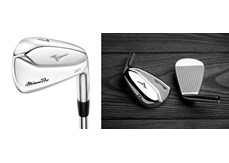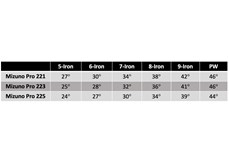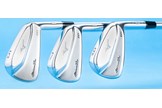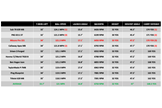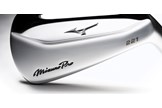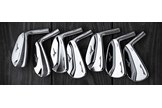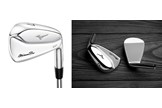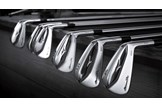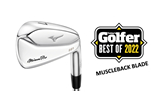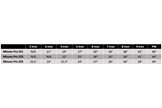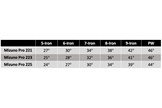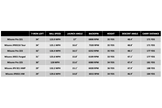Mizuno Pro 221 Iron Review
Last updated:
-
At a glance
- TG Rating
- Owner Rating
What we say...
The Mizuno Pro 221 irons are a forged muscleback blade aimed at golf traditionalists, the best ball strikers and shot shapers.
Mizuno are a fast-changing brand. The Japanese sporting giants may have over 100 years of heritage to boast about and have always made some of the best golf irons but they’ve never seen such fast-paced growth or increased levels of interest in their products as over the last five years.
In the last half-a-decade Mizuno’s US sales have risen from $35 to $85 million and Google searches for Mizuno drivers are now greater than when they sponsored the World No.1 men’s and ladies’ players (Luke Donald and Stacy Lewis), back in 2011.
Mizuno reckon the average age of customers has dropped from 46 to 41 years old and that’s been achieved without splashing out on multi-million-dollar tour players to play their clubs. Essentially, since the brand has taken making a great driver seriously (the ST family), and because of a new focus on young online and social media savvy golfers, perceptions are shifting and the brand’s fortunes have taken a serious uptick. So much so Mizuno now feel free from working in the crevices left by golf’s other major brands.
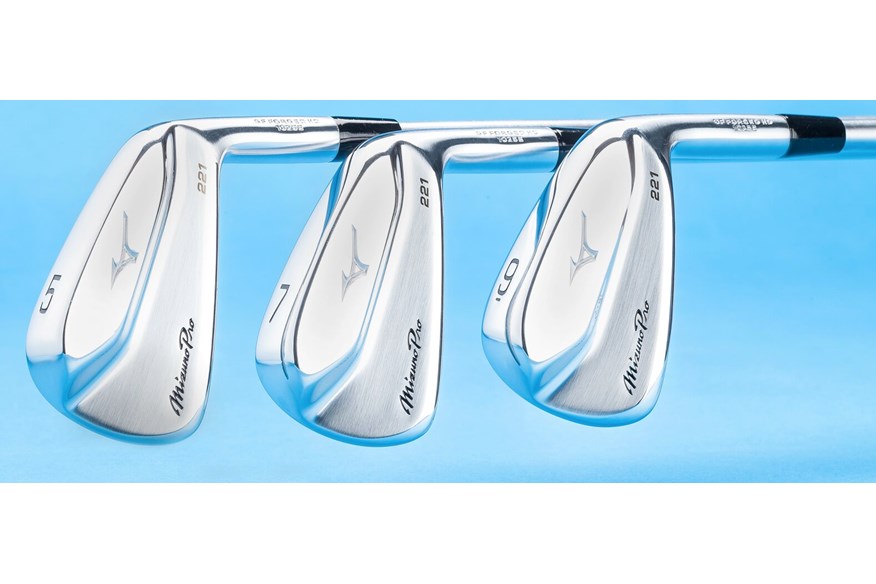
Mizuno say they’re seeing more 25+ year olds flood into the game than ever, and the younger generation are happily buying into Mizuno through the bag. The young blood don’t come with preconceived ideas and are much more willing to take things at face value. It means modern Mizuno fans have no memory of which brands historically were strong at drivers, forged irons or putters, which is part of the reason driver and putter sales are soaring.
Mizuno reckon they’ve come so far they’re now happy to let go of their predominantly forged iron history. Dave Matthews, Western Global Brand Marketing Manager, said: “History has gone and it’s not coming back, our past is not our future”.
Yes, 13 of the previous 24 World No.1 players have played Mizuno at some point in their careers, but focus has now switched to creating a farm of young talent on tour and using YouTuber Garrett Clark (515K subscribers) to create content that speaks direct to their new younger audience.
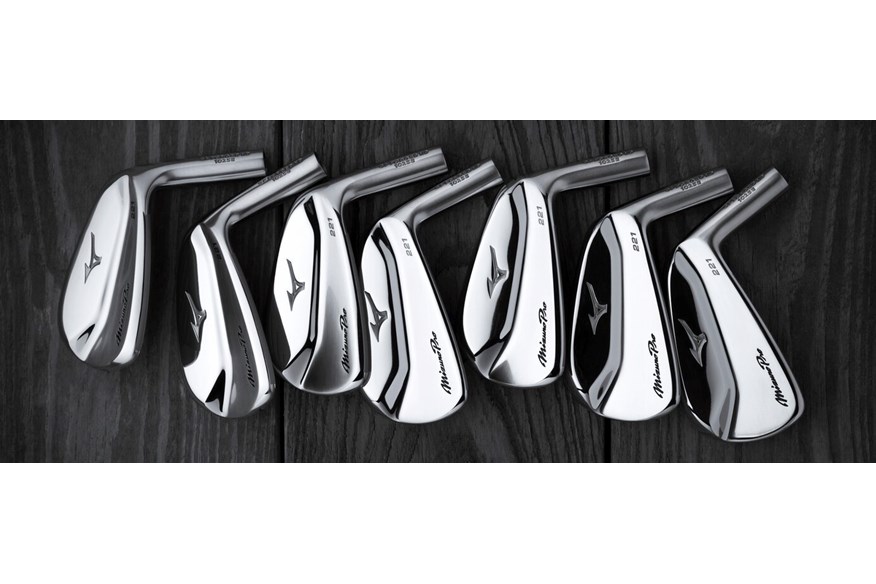
With a such fresh new ideas driving the company, the timing couldn’t be more perfect to break with tradition and bring, for the first time ever, Mizuno Pro irons to the western world. Here’s what you need to know about them.
Why Mizuno Pro and not TP or MP?
Until now Mizuno Pro irons have been reserved exclusively for the Japanese market. Japanese golfers put a super-premium on high quality materials and outstanding craftmanship, so the suits at Mizuno naturally felt the need to reserve a high level of exclusivity to the forged irons sold to their Japanese audience.
That sort of thinking has meant that over the last few decades in the western world we’ve become accustomed to first Mizuno TP irons, before the Mizuno MP irons became the forged iron choice for traditionalists and shot shapers.
But Mizuno is a rapidly changing business. Focus has shifted to attracting and maintaining the attention of a younger more connected/online audience and, because sales are on a steep upward trajectory, protectionist thinking has been consigned to the past.
For 2022 Mizuno are going global with the new Mizuno Pro 221, 223 and 225 irons.
At a glance: Mizuno Pro 221 irons
RRP: £165 per club
Availability: 3-PW
Stock shaft: Choose from 21 premium options
7-iron loft: 34°
Forgiveness rating: 1 (Muscleback/Blade)
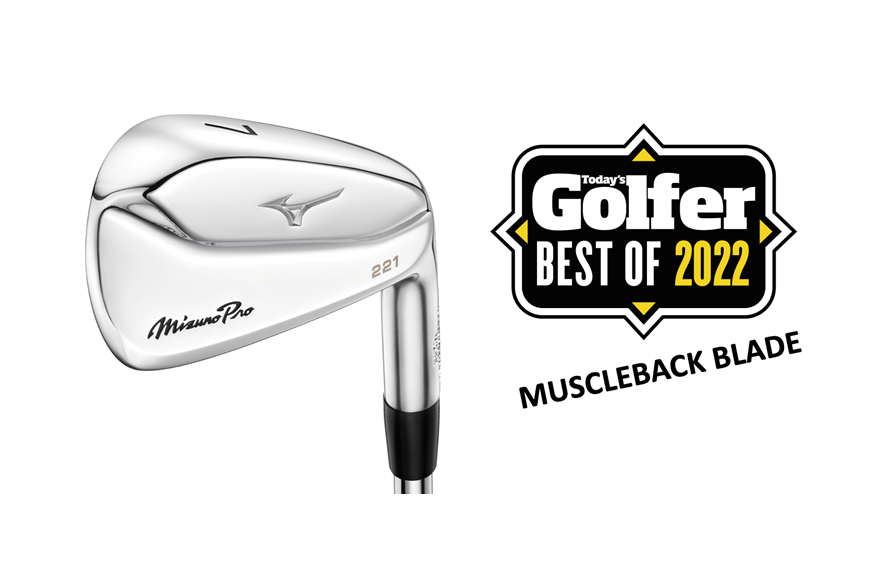
Mizuno Pro has always been the brand’s most forward-thinking, cutting-edge product line-up, so with the brand transitioning to a new audience there’s benefits in rolling Mizuno Pro (it’s exactly the same product and logo as the Japanese market) out globally rather than just staying within the domestic market. Mizuno say they’ve taken inspiration from a 1981 Mizuno Pro logo, yet they insist none of the Mizuno Pro 221 / 223 / 225 are retro clubs and will instead create their own history.
The Mizuno Pro 221 irons are classic forged muscleback blades. Compared to the previous MP-20 MB model there’s more mass behind the hitting area which gives a more muted, tour preferred sound and feel.
Like the previous MP-20, each head has a super thin copper coating (as do the Pro 223 and Pro 225 irons) to ensure feel and feedback are identical to Mizuno’s most revered irons of the 1980s. Chris Voshall, Product Manager at Mizuno Golf says “the heads are small and sleek, with a slightly tapered blade and fractionally adjusted centre of gravity location to promote extra consistency from 3 iron to PW”.
Expect even smaller, more compact scoring irons (than the MP-20 MB), which Voshall says “is what better players look for”.
RELATED: Jump to the Mizuno Pro 223 iron review
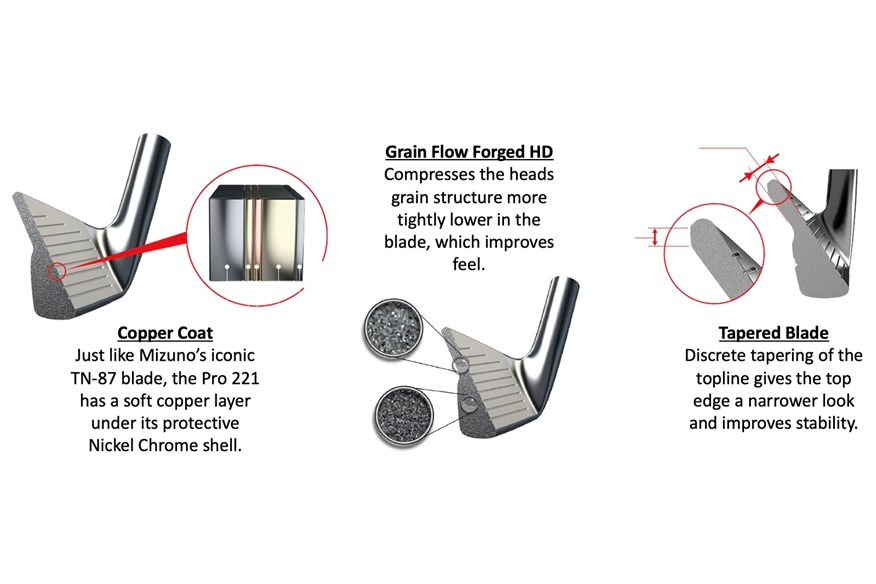
Mizuno on the Pro 221 irons
Mizuno Pro 221 is the ultimate muscleback iron, inspired by iconic Mizuno blades of the past.
The Pro 221 has evolved to be more playable through incremental refinements in shape and weight placement. The irons have been bevelled for the appearance of a shorter face profile and narrower top line, but without loss of mass in the upper blade. The 221s are dramatically more compact in the scoring irons than their predecessors. They feature Mizuno’s shortest centre of gravity / shaft axis which is consistent from 3-iron to PW, allowing for controlled shot shaping through the set.
Grain Flow Forged in Hiroshima, Japan where Mizuno irons have been produced since 1968, they feature a soft copper underlay for a uniquely satisfying Mizuno sensation at impact.
RELATED: Jump to the Mizuno Pro 225 iron review
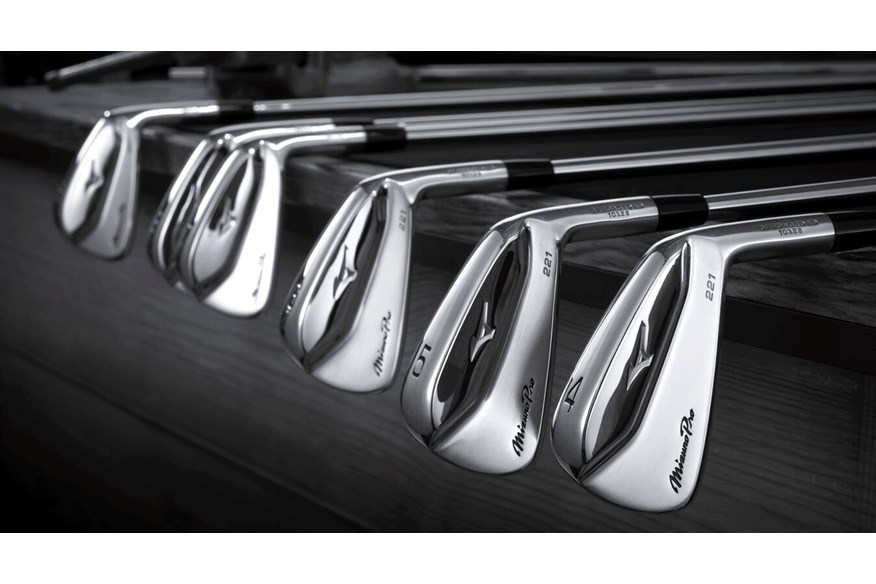
“We’re obviously working in small increments on a Mizuno muscleback – we have to dig quite deep to get any negative feedback,” says David Llewellyn, Director of R&D for Mizuno. “The copper underlay and Grain Flow forging was such a great foundation on the MP-20. Players with a good eye will enjoy the subtle shape changes through the set – especially the 8, 9, PW.”
“The concept of Mizuno Pro can be misunderstood – we’re not trying to design instant classics or works of art. Mizuno just hides technology incredibly well. This could be perceived as the ultimate betrayal of Mizuno Pro. But the true essence has always been to make history – not be stuck in it,” added Chris Voshall, Product Manager, Mizuno Golf.
See why the Mizuno Pro 221 was one of the best blade golf clubs in our test.
WATCH: Luke Donald tests the new Mizuno Pro 221, 223 and 225 irons
Got a question about the Mizuno Pro 221 iron? Ask us on Twitter.
Verdict: Mizuno Pro 221 irons
The 221 is the archetypal muscleback. To be fair to any brand making blades though there’s not too much engineering designers can change before fans start complaining about differences being too extreme and then declining to put them in play. It means changes can be hard to spot.
What you get with the lovely 221 though is a shape, look and very simple styling that will be just as relevant in 10 years as it is today, and that’s a theme that runs through all three Pro models. We can’t say our test pro felt too much difference between the Pro’s copper layer (under the chrome finish so you can’t see it) and the JPX921 Tour, which doesn’t have the tech. But for true feel players you’d always want any feedback advantage stacked in your favour.
Most club golfers just aren’t consistent enough ball strikers to even entertain putting a set of 221s in play. And if most club golfers are honest they’d probably just love to hit more shots straighter. If you are good enough, you won’t give a damn about the 7-iron costing you 4.1mph of ball speed and 10 yards of carry (at a decent swing speed) against the brilliant hollow body 225 or 2.5 mph and 6 yards versus the 223.
How Mizuno’s 2022 irons compare in data
Mizuno Pro 221 vs Pro 223
Forged tour level and muscle cavity back irons have risen dramatically in popularity over the last couple of years, so much so most brands sponsoring elite tour players now want a compact forged cavity back within their line-up. Our pro loved the size, shape and feel of the 223s and the data consistency between shots was absolutely perfect for him.
Don’t be fooled into thinking the cavity back makes the 223 a good fit for mid-handicap golfers; Mizuno’s own website lists the model as typically being a good fit for 5-9 handicappers. Compared to the 221, the 223’s 2° stronger 7-iron (and more lively chromoly head material) produced 2.5mph more ball speed and six yards more carry.
But we feel more golfers will find themselves choosing between the 223 and the hollow body 225. What’s really important to understand is the stronger 225 (by 2° of loft) produced a 1.6mph faster ball speed and four yards more carry, but it did that while producing very similar backspin, peak height and descent angle numbers to the 223.
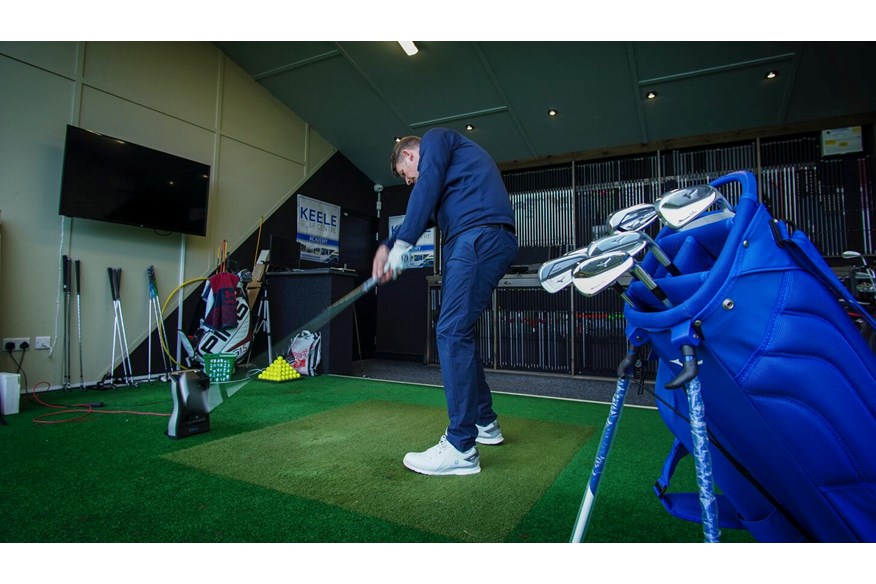
Mizuno Pro 221 vs Pro 225
If combining the looks of a blade with the performance of cavity backs was the original goal for developing hollow body irons, the super sleek 225 absolutely nails the brief. The model is so well styled and proportioned there will be plenty of golfers who don’t even realise it’s not a muscleback blade and confuse it for the 221.
The 225 brings together complex different constructions and materials to get optimal performance across the set, which of course explains the additional cost.
Interestingly Mizuno don’t list the 225 as their best fitting iron for either 5-9 or 10-14 handicappers. Instead they say the model is more forgiving than the 223 but more workable than the JPX921 Forged model. Which inevitably will cause a little confusion around how to choose between the two.
Our data suggests at decent speeds there’s a 2.4mph ball speed and 4 yard carry distance gain in favour of the 225, with spin, height and descent angle remaining almost identical.
For most golfers, so long as you’re happy to stomach the extra £350 (for 7 clubs) for a set, those numbers will likley swing you towards the 225. For those who don’t want to stretch that far, or players who are still yet to be convinced by the consistency of hollow body irons, then of course the JPX921 Forged will happily step in.
A brilliant, compact players’ distance iron for 2022 and beyond.
How does the Mizuno Pro 221 iron compare to other leading muscleback blades in data?
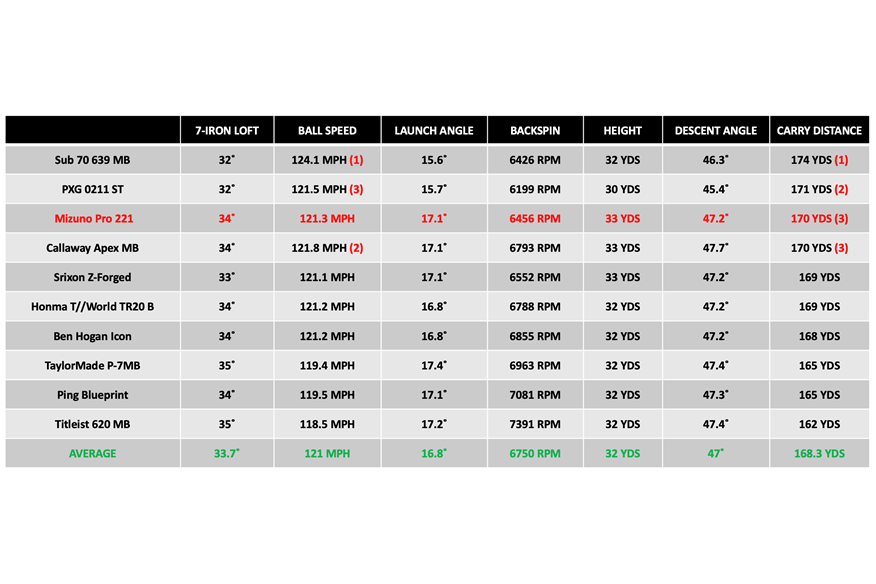
Specs: Mizuno Pro 221, 223 and 225 iron lofts
READ NEXT: Which Mizuno iron suits me?
Review written by: Simon Daddow

About the author:
Simon Daddow is the Equipment Editor at TodaysGolfer.co.uk
Simon has worked in the golf industry for 30 years. Starting out as trainee professional at Downes Crediton GC where he learned the art of golf club making, before going onto work for Clubhaus Plc and Tony Charles Ltd as a golf club maker, and running Product Development at Benross Golf.
Joining EMAP Active (now Bauer Media) in 2006 as Equipment Editor, Simon has worked for Today’s Golfer and Golf World magazines and the Today’s Golfer website.
Simon is 46 years old, he’s played golf for 40 years and plays to a handicap of 10.
A lack of club speed means he’s short off the tee, but very handy from 125 yards and in.
Product Information
Mizuno Pro 221 Iron
RRP: £165 per club
Availability: 3 - PW
Stock shafts:
KBS $-Taper Chrome or Black PVD - Mid Trajectory
KBS $-Taper Lite Chrome or Black PVD - Mid/High Trajectory
KBS C-Taper - Mid/Low Trajectory
KBS C-Taper Lite - Mid/High Trajectory
KBS Tour - Mid Trajectory
Nippon N.S. Pro Modus Tour 105 & 120 - Mid Trajectory
Nippon N.S. Pro 950GH - High Trajectory
Nippon N.S. Pro 950GH Neo - High Trajectory
True Temper Dynamic Gold - Low Trajectory
True Temper Dynamic Gold Tour Issue - Low Trajectory
True Temper Dynamic Gold 120 - Low Trajectory
True Temper Dyanmic Gold 105 - Mid/Low Trajectory
Project X LS & LS Blackout - Low Trajectory
Project X - Low Trajectory
Project X 10 - Mid Trajectory
Project X LZ - Mid Trajectory
UST Mamiya Recoil 95 (graphite) - Mid Trajectory
UST Mamiya Recoil ESX (graphite) - High Trajectory
7-iron loft: 34°
Forgiveness rating: 1 (Muscleback Blade)
Visit the Mizuno website here
